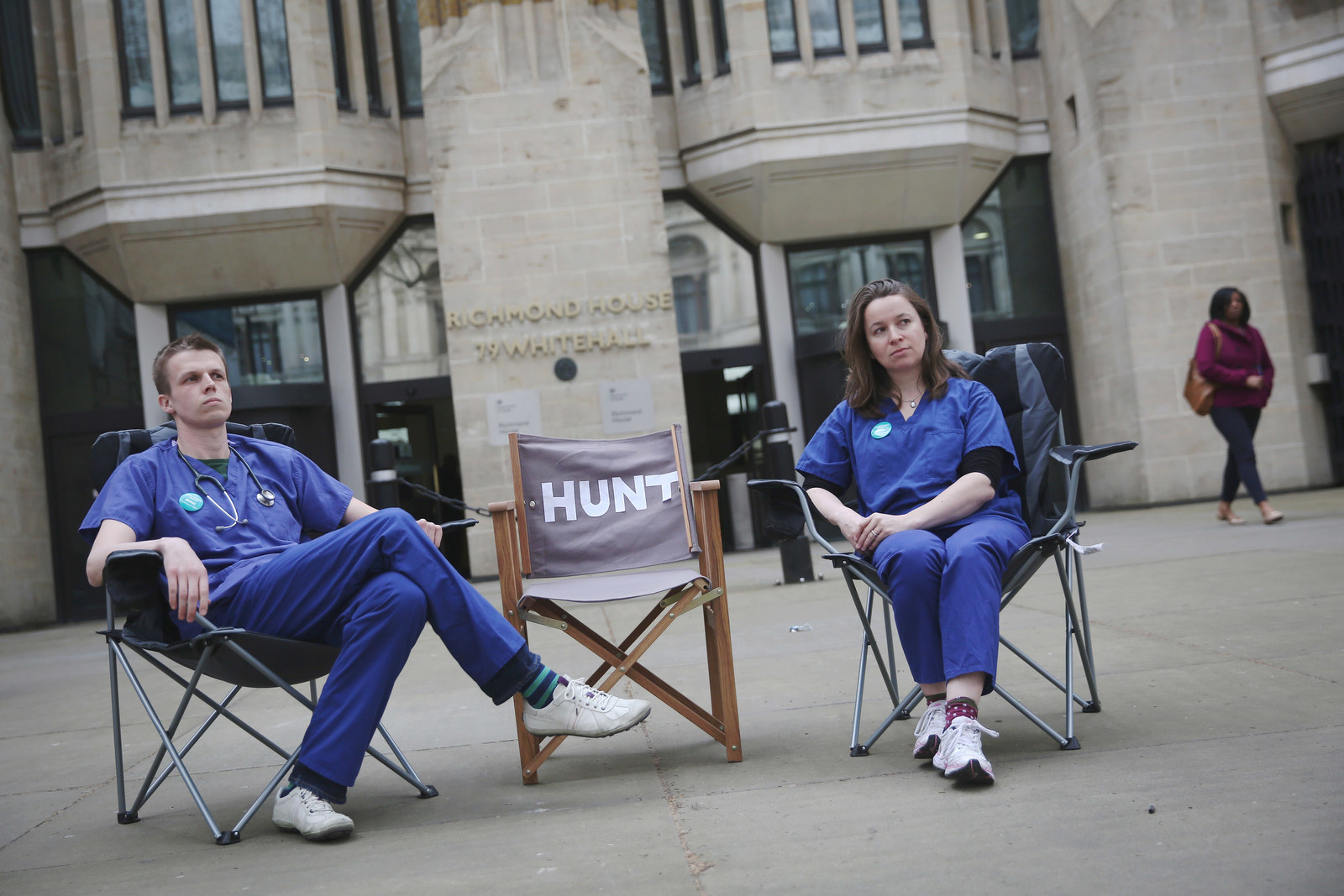Junior doctors have issued a fresh plea for their union to increase pressure on the government to invest more in staffing if a "seven-day NHS" is to be achieved safely.

After 58% of junior doctors balloted in early July voted to reject the latest contract agreed by the government and the British Medical Association (BMA), health secretary Jeremy Hunt announced he would impose it anyway this autumn.
Now more than 1,000 junior doctors have written to the BMA's chair, Dr Mark Porter, urging him to continue to challenge the government's belief that increased services can be delivered without employing more doctors.
"We utterly reject the notion that a cost-neutral budget could ever deliver two extra days of full services in the NHS each and every week," the letter reads.
When the Conservative government proposed what it called a "seven-day" NHS as part of its 2015 election manifesto, it made clear no extra money would be available to fund the changes. Detailed plans of what the extended service would look like are still unclear, but are believed to include operations and non-emergency procedures on weekends.
The latest version of the contract was agreed by the BMA after the government reopened negotiations in May, but doctors are now asking the union's chief to reconsider its stance in the face of strong opposition from the membership.
Dagan Lonsdale, one of the junior doctors who organised the letter, told BuzzFeed News that continued opposition to the contract disproved claims made by Hunt that the BMA had "distorted" the government's message to win support.
"We will not just allow this contract to be quietly imposed over the next couple of months," Lonsdale said.

The letter lays out three key areas of concern that doctors would like Porter to challenge the government on:
1. We reject wholly the notion that services, currently understaffed and stretched to breaking point, can be expanded with no extra investment, staffing or infrastructure.2. We ask that you publicly recognise and address our deep concerns about safe staffing levels amongst junior doctors and the safe guarding of our training so we can expertly staff the NHS of the future.
3. We ask that you publicly recognise that the proposed conditions are unacceptable to junior doctors and that significant improvements must be made. This must include a clear demand for an appropriate increase in funding for the NHS and the contract if there is to be an increase in services across 7-days.
While several rounds of industrial action by junior doctors did lead to some improvements to the original contract proposed last autumn, doctors are wary of launching more strikes. Instead they are appealing to Porter to work directly with the government to halt Hunt's imposition.
The letter was issued on the day that Theresa May becomes Britain's new prime minister following David Cameron's resignation.
May is expected to appoint a new cabinet, which could see Hunt replaced as health secretary.
Lonsdale welcomed the possibility that responsibility for resolving the junior doctors dispute could fall into new hands, saying Hunt had been a "roadblock" to a satisfactory agreement being reached.
The BMA junior doctors committee also has a new chief, Ellen McCourt, who replaced Johann Malawana after doctors voted to reject the latest contract.
"Now is a very good time to build new relationships between government and healthcare professionals," Lonsdale added. "It would be a great time for both sides to wipe the slate clean from what has been quite an acrimonious dispute and say junior doctors clearly want to work with government to improve things."
A spokesperson for the BMA said the union had called upon the government to respect junior doctors' vote against the contract, adding that Hunt would "alienate a generation of doctors and store up problems for the NHS in the future" as a result of imposition.
“A new contract will affect the thousands of doctors who form the backbone of our NHS, with direct impact on the delivery of patient care in the long term," the BMA spokesperson said. "Any new contract will shape 10 years or more of junior doctors working lives, making it vital that it has the full support of the profession.
“The BMA has always been clear in its desire for a negotiated end to this dispute and we remain committed to delivering on this. We will now consult with members to decide our next steps.”
Read the full letter here:
To: Dr Mark Porter
Chair of Council British Medical Association
BMA House
Tavistock Square
WC1H 9JP
13th July 2016
Dear Dr Porter,
We, the undersigned, are writing to you in your capacity as Council chair and leader of our union, the British Medical Association. This letter follows the publication of the results of the ballot of members on the proposed Junior Doctor Terms and Conditions of Service, put to us by the BMA Junior Doctors Committee (JDC) in May 2016. As you know, the membership have rejected these proposed terms and conditions.
Despite improvements in some areas of the contract, the terms and conditions of service did not go far enough to ensure the safety of our patients. There remains much work to be done to ensure safe staffing within our hospitals. In our view, the contract does not adequately address this issue as the safeguards are untried, untested and crucially not trusted. It also, fails to deliver the improvements required to address recruitment and retention of doctors in training, most notably in the acute specialties.
Further, the regressive nature of the contract for those who work less than full time, the majority of whom are women, those with a disability or caring role, is wholly unacceptable to the majority of us. Finally, we do not have faith that the issue of protection for doctors in training who whistleblow have been adequately addressed.It has been apparent for a long time that the Government's sole aim with this contract is to provide a mechanism through which they can claim to meet their uncosted, unplanned and unstaffed "7-day NHS"; manifesto soundbite.
Overstretching the workforce from 5 days to 7 is dangerous and forcing doctors to work longer, more antisocial hours for less is an unreasonable expectation for a workforce that have had a 17% real terms pay cut over the last 5 years (1).We utterly reject the notion that a cost neutral budget could ever deliver two extra days of full services in the NHS each and every week.
We are in deeply uncertain times. In the past two weeks the country has voted to leave the European Union and the Prime Minister has resigned. The Chancellor of the Exchequer last week rescinded his budget plan to be in surplus by 2020.
The architects of the "truly 7 day NHS"; election manifesto to be delivered on a cost neutral budget and conflated with the ongoing Junior Doctors Contract renegotiation in 2014, may no longer be in government in the coming weeks.
We gave you a 98% mandate for industrial action to achieve an acceptable negotiated outcome. As the leader of our union we ask that you represent your members views:
1. We reject wholly the notion that services, currently understaffed and stretched to breaking point, can be expanded with no extra investment, staffing or infrastructure.
2. We ask that you publicly recognise and address our deep concerns about safe staffing levels amongst junior doctors and the safe guarding of our training so we can expertly staff the NHS of the future.
3. We ask that you publicly recognise that the proposed conditions are unacceptable to junior doctors and that significant improvements must be made. This must include a clear demand for an appropriate increase in funding for the NHS and the contract if there is to be an increase in services across 7-days.
Finally, we wish to recognise the extraordinary leadership of Dr Johann Malawana as JDC Chair and to thank him, his negotiating team, and the JDC for all they achieved. Johann has previously indicated his intentions to resign in the light of a "no vote".
We understand that this is a personal decision for him to make but hope that he will remain in at least some capacity within the JDC executive to continue to provide leadership for Junior Doctors.Yours sincerely,
Dr Dagan Lonsdale, Dr Taryn Youngstein, Dr Rachel Clarke, Dr Ben
White, Dr RoshanaMehdian, Dr Lauren Gavaghan, Dr Marie-Estella
McVeigh, Dr Nadia Masood, Dr Animesh Singh, Dr Palak Trivedi, Dr Matteo De
Martino, DrFrancesca Silman, Dr Mohsin Khan, Dr Hugo Farne and over 1000 doctors co-signed on the attached list of signatories.
(1) Memorandum of Evidence to the Review Body on Doctors’ and Dentists’ Remuneration, Sept 2015 https://www.bma.org.uk/collective-voice/influence/key- negotiations/doctors-pay/pay-negotiations
